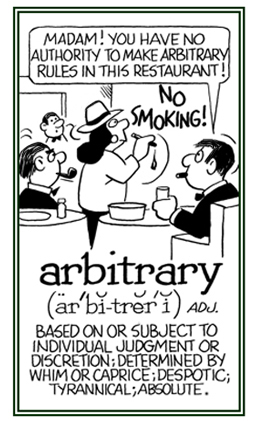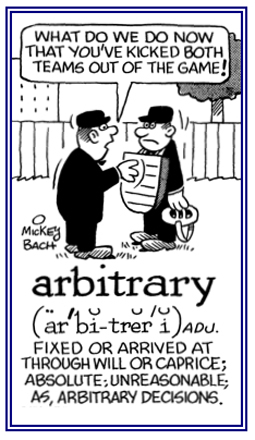arbitr-, arbit-
(Latin: consider, judge; spectator, listener, witness; originally, "decided by one's own discretion or judgment")
Ad arbitrium. (Latin phrase)
Translation: "Anything done by one's own will."
1. A person who is considered to be an authority on what is good, right, or proper: Hugo was an arbiter who wrote editorials for his newspaper.
2. Someone who has the authority to settle an argument between people: The chairperson will be the final arbiter in any disputes among the members of the committee.
3. Etymology: from Old French arbitre or directly from Latin arbiter, "one who goes somewhere (as witness or judge)" and in classical Latin, "he who hears and decides a case, a judge, an umpire, a mediator"; from ad-, "to" + baetere, "to come, to go."
2. Someone who has the authority to settle an argument between people: The chairperson will be the final arbiter in any disputes among the members of the committee.
3. Etymology: from Old French arbitre or directly from Latin arbiter, "one who goes somewhere (as witness or judge)" and in classical Latin, "he who hears and decides a case, a judge, an umpire, a mediator"; from ad-, "to" + baetere, "to come, to go."
arbitrable (adjective), more arbitrable, most arbitrable
A reference to that which can be decided on or determined: The company and the union felt that the wages and the health benefits were arbitrable.
The arbitrable decision was to be considered by the company's top official for a final settlement with the union.
The simultaneous buying and selling of securities, currency, or commodities in different business markets: An arbitrage is used for trading derivative forms (customized contracts transacted outside of security exchanges) in one market for the immediate resale in another market in order to profit from unequal prices or the differences in prices of the two places.
Someone who is involved with purchases of securities in one market for the immediate resale in another one in the hope of profiting from the differences in prices: As an executive of an investment company, Steve was an arbitrager who strived to make profits for his customers.
arbitral (adjective), more arbitral, most arbitral
A reference to being subject to review and adjudication or reaching a mutual agreement: The union and the company made an arbitral adjustment of the controversy over wages.
The power or right to decide for one's self or for others: The arbitrament resulted in an absolute and final decision made by a judge.
arbitrarily (adverb), more arbitrarily, most arbitrarily
A reference to something that is not chosen for any particular reason: Jim arbitrarily chose the number that won a jackpot.
Mack's family is arbitrarily going to France instead of California during the summer.
Rules that are random, unpredictable, and without reason: When Billy's mother told him that he couldn't go to a movie, he asked "Why not?" and she responded with an arbitrariness, "Because I said so!"
The arbitrariness of his mother's decision made him very angry.
arbitrary (adjective), more arbitrary, most arbitrary
1. Descriptive of decisions made by a person's liking; dependent upon someone's will or pleasure; at the discretion or option of another individual: The supervisor made an unplanned and arbitrary decision to cancel the meeting this afternoon.

© ALL rights are reserved.

© ALL rights are reserved.

© ALL rights are reserved.
Go to this Word A Day Revisited Index
The company is experiencing an arbitrary takeover by another business.
2. Unrestrained in the exercise of the will; of uncontrolled power or authority, absolute; hence, despotic and tyrannical: Despite the fact that arbitrary arrests are usually illegal, they continued to take place in certain areas of the community.


Go to this Word A Day Revisited Index
so you can see more of Mickey Bach's cartoons.
arbitrate (verb), arbitrates; arbitrated; arbitrating
To settle a disagreement or an argument between two or more people or groups after hearing the opinions and ideas of both: Kate will arbitrate the dispute between her son and daughter as to which one will get to eat the last piece of cake.
An official was assigned to arbitrate which runner crossed the finish line first.
2. Etymology: from Latin arbitrat-, "judged"; from arbitrari, "to judge" from arbiter, "judge, supreme ruler".
A process of settling a dispute or disagreement in which the people, or groups, on both sides present their opinions and ideas to a third party for a decision: The equally qualified applicants for the job agreed to go to arbitration to determine who would be hired for the position.
Someone who hears both sides of a dispute and then makes a decision: An arbitrator acts like a judge and determines which side is right.
Both of the authors agreed to accept a decision by an impartial arbitrator as to which book would be published first.
Last year in the case of the divorce, the judge acted as the arbitrator by deciding which parent the children would live with.
Arbitrio suo. (Latin phrase)
Translation: "On his or her own authority."
The process of resolving a dispute or a grievance outside a court system by presenting it for decision to an impartial third party: A binding arbitration means that two sides have agreed to, or are forced to, accept a judge's decision.
<img src="/img/left_arrow_sm.gif" alt="" /> <img src="/img/right_arrow_sm.gif" alt="" />
Showing 1 page of 15 main-word entries or main-word-entry groups.
